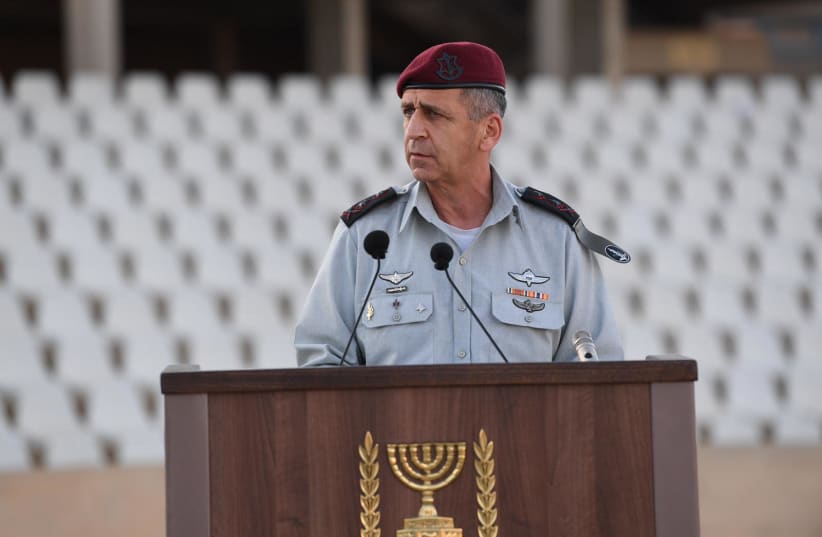IDF Chief of Staff Lt.-Gen Aviv Kochavi’s speech on Tuesday night, in which he expressed a complete rejection of a renewed nuclear deal with Iran, attracted major criticism by those who say that his remarks were out of line and that behind his agenda lie hidden motives.
Kochavi said that a return to the 2015 nuclear deal with Iran, or a “slightly improved” one, would be an operational and strategic mistake for the world.
If Iran’s progress in developing advanced centrifuges and enriching uranium is not stopped, it could eventually be only weeks away from a nuclear bomb, he warned.
Some of Kochavi’s critics claimed that his remarks extend Prime Minister Benjamin Netanyahu’s effort to undermine American policy on Iran. They also said that it’s not the most senior IDF officer’s place to lecture our closest ally, which annually gives the IDF $3.8 billion for defense purposes.
Others said that making Iran the center of attention – saying it’s a global problem, while neglecting topics such as civil society issues and the heated situation in the West Bank – is part of a campaign to increase the defense budget.
However, that kind of analysis is short-sighted and ignores the larger picture, former Air Defense Corps commander Brig.-Col. (ret.) Zvika Haimovich told The Jerusalem Post on Wednesday. Haimovich holds that Kochavi’s speech was just one point in a string of efforts to combat the Iranian attempt to develop a nuclear bomb.
“If we take this speech seriously – and we should take it seriously – this process did not start with the chief of staff’s speech, nor with the Obama administration agreement with the Iranians in 2015,” he said.
“This is a process of about a decade when the Iranians declared that they are starting a race toward a nuclear bomb.... I think that in light of the administration change in the US, there’s a peak [in this process], and we should do whatever it takes, whether it’s in diplomacy or in other measures, to make sure that the Iranian regime will not have a nuclear bomb,” he added.
Haimovich thinks that the discourse around a possible attack on Iran should be over two main things – what does Israel want to achieve, and how would such a move affect day-to-day life in Israel and its security.
When it comes to setting goals, Haimovich said that “thinking that an attack will completely destroy the Iranian nuclear plan is too ambitious. But we should aim to ask how long such a strike will delay Iran’s ability to get a nuclear weapon.”
Haimovich stressed that the discourse could be about whether complete destruction of Iran’s nuclear plans is feasible. Unlike past strikes against nuclear facilities in the region, such as the attack on the Osirak nuclear reactor in Iraq in 1981, which was one facility, the Iranian nuclear program is spread over several locations, and some facilities are well protected underground.
Such an attack would happen in waves, over a period of time. “It’s not one hit and we’re done, not in one day,” he said.
Regarding the impact on Israel’s security and daily life, Haimovich said that the question should be what will be Iran’s response and how it will impact the home front.
“I will be very surprised if Iran will not respond to such an attack – whether directly from Iran or from its proxies in the region, such as Hezbollah, Syria, or the Houthis of Yemen,” he said.
“I am sure that a response will come. And it will not be like anything we’ve seen so far – not like Operation Protective Edge and not like the Second Lebanon War.”
Some have speculated that the delay in a major aircraft deal between Israel and the US due to an argument between the Defense and Finance ministries over payment methods is harming Israel’s readiness for such a scenario.
As part of the deal, the IAF is expected to receive new platforms, such as tankers, fighter jets, and helicopters.
Haimovich rejected the idea that the delay damages Israel’s readiness, saying that implementation of this deal will take around a decade.
“This is not about being ready tomorrow, or in a year from now,” he said.
